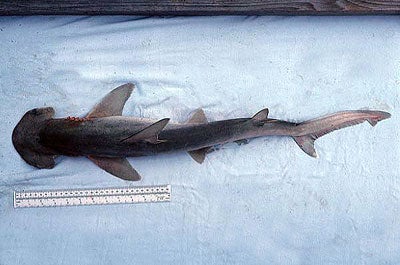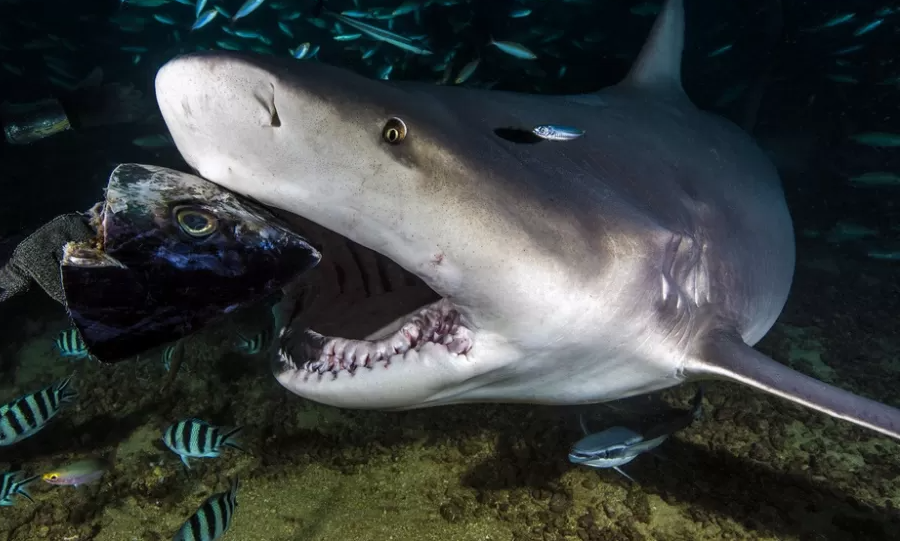Many years ago, a local radio station pulled an April Fools prank telling the listeners of a newscast that a “pod” of sharks had been spotted in the Savannah River near Riverwalk.
The prank caused traffic jams in Downtown Augusta with people wanting to get a glimpse of the sharks.
Of course, sharks don’t travel in pods and there is the New Savannah Bluff Lock and Dam that prevents any fish, even the bull shark, one of the few shark species who can survive in freshwater, from making its way to Riverwalk; however, the stunt proved once again that people have a morbid curiosity and remain terrified of the ocean’s apex predator.

The movie “Jaws,” based on the novel by Peter Benchley, is generally credited with creating the irrational fear in humans of sharks, particularly the great white.
Even Steven Spielberg has voiced regrets about the impact of the film he directed.
“I truly and to this day regret the decimation of the shark population because of the book and the film,” Spielberg was quoted as saying by the BBC.
A recent headline stated that boaters were “surprised” when a white shark breached the water and “lunged” at their boat. Later in the article it was disclosed that the water near the boat had been “chummed” and the shark was aiming at a dangling bait ball when it broke the surface.
Rather than being some terrifying moment at sea, it really was more like watching a dog jump up for a treat.
Another set of headlines describing the tragedy of a teenager drowning recently, after jumping overboard from a party boat, claimed the young man jumped into “shark infested waters.”
Devin Dumont, curator of the UGA Aquarium in Savannah, which is a part of the UGA Marine Extension and Sea Grant, begs to differ. Sharks do not “infest” waters as the ocean is their natural habitat, Dumont says.
Researchers from the Cal State Long Beach Shark Lab conducted a study using drones and found, after two years of surveys, that sharks were active extremely close to swimmers and surfers 97% of the time. Even though the beasts were swimming much closer than most people’s comfort zones allow, not one person was attacked.
According to Dumont, the study is proof that humans are not on the shark menu.
“No, sharks do not seek out humans, most of the time they will swim away, but sharks are opportunistic feeders and sometimes accidental encounters do occur,” Dumont said.

Georgia’s coastline is home to several species of shark, including the Atlantic sharpnose, bull, blacktip, lemon, great white and bonnethead, the latter of which is a quirky looking relative of the hammerhead and can grow to about four feet in length.
Out of all of those species, only the bull shark is considered a serious threat to humans and it is not because the fish seeks out human encounters, but rather their aggressive nature causes them to bite first and ask questions later, according to National Geographic.
Wine bottles, tom-tom drums, a full suit of armor and even bowling balls have been found in the stomach of captured bull sharks.
According to Dumont, there are several steps people can take to avoid encounters with sharks.

“Steer clear of areas where people are fishing, never swim at dusk or dawn when sharks are known to feed, swim in groups and if you see flocks of birds circling an area, that means a school of bait fish is in the area and you should wait for the school to pass. Those are some of the things you can do,” Dumont said.
Dumont also says to avoid wearing jewelry that might sparkle in the water and never, ever go into the ocean with an open wound or cut as sharks can smell blood up to a quarter mile away, much like humans can smell the aroma of McDonald’s fries before the restaurant even comes into view.
The bottom line is that sharks are far more susceptible to human attack than the opposite. The journal Nature published a peer-reviewed article stating that shark populations across the world’s oceans have declined over 70% since 1970, mostly because of overfishing.
Some commercial fishermen are known to catch sharks and cut off their fins, which are delicacies in some parts of the world. The creatures are then thrown back into the water where they writhe in agony until they drown.
The National Oceanic and Atmospheric Administration banned shark finning in U.S. territorial waters in 1993, but shark fin soup can still be imported into the country from Asia.
“Sharks are critical as apex predators because they maintain the overall balance in the food web, without them, everything falls out of balance,” Dumont says.
Scott Hudson is the Senior Investigative Reporter and Editorial Page Editor for The Augusta Press. Reach him at scott@theaugustapress.com












